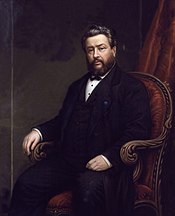Downgrade Controversy
| Charles Haddon Spurgeon | |
|---|---|
 |
|
| Born |
19 June 1834 Kelvedon, Essex, England |
| Died | 31 January 1892 (aged 57) Menton, Alpes-Maritimes, France |
| Nationality | British |
| Occupation | Pastor, author |
| Spouse(s) | Susannah Spurgeon (born Thompson) (22 October 1903) |
| Children | Charles and Thomas Spurgeon (twins) (1856) |
| Parent(s) | John and Eliza Spurgeon |
Charles Haddon Spurgeon (/ˈhædən ˈspɜːrdʒən/; 19 June 1834 – 31 January 1892) was an English Particular Baptist preacher. Spurgeon remains highly influential among Christians of various denominations, among whom he is known as the "Prince of Preachers". He was a strong figure in the Reformed Baptist tradition, defending the Church in agreement with the 1689 London Baptist Confession of Faith understanding, and opposing the liberal and pragmatic theological tendencies in the Church of his day. He also famously denied being a Protestant, and held to the view of Baptist Successionism.
Spurgeon was the pastor of the congregation of the New Park Street Chapel (later the Metropolitan Tabernacle) in London for 38 years. He was part of several controversies with the Baptist Union of Great Britain and later he left the denomination over doctrinal convictions. In 1867, he started a charity organisation which is now called Spurgeon's and works globally. He also founded Spurgeon's College, which was named after him posthumously.
Spurgeon was a prolific author of many types of works including sermons, an autobiography, commentaries, books on prayer, devotionals, magazines, poetry, hymns, and more. Many sermons were transcribed as he spoke and were translated into many languages during his lifetime. Spurgeon produced powerful sermons of penetrating thought and precise exposition. His oratory skills held his listeners spellbound in the Metropolitan Tabernacle and many Christians hold his writings in exceptionally high regard among devotional literature.
...
Wikipedia
